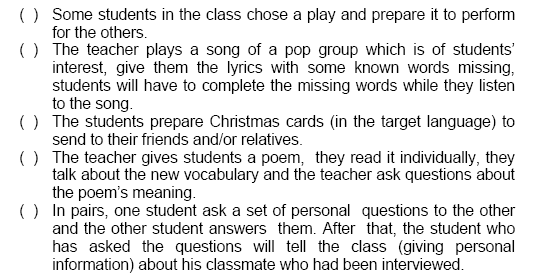Questões de Língua Inglesa do ano 2003
Lista completa de Questões de Língua Inglesa do ano 2003 para resolução totalmente grátis. Selecione os assuntos no filtro de questões e comece a resolver exercícios.
Língua Inglesa - Interpretação de Texto - Fundação de Estudos Superiores de administração e Gerência (ESAG) - 2003
Cognitive abilities, tactics, techniques, language processing, conscious plans, and problem solving procedures are terms related to:
- A.
Language.
- B.
Behavior.
- C.
Theory.
- D.
Strategy
Língua Inglesa - Interpretação de Texto - Fundação de Estudos Superiores de administração e Gerência (ESAG) - 2003
Two complementary modes compose classroom interaction: One refers to talk with a pedagogical formal language goal. The other mode refers to talk without a pedagogical formal language goal. They are not static, there can be an overlapping between them. These two modes are called respectively:
- A.
Language goal mode and meaning mode.
- B.
Focus-on-meaning mode and focus-on-form mode.
- C.
Focus-on-form mode and focus-on-meaning mode.
- D.
Communication mode and Focus-on-form mode
Língua Inglesa - Interpretação de Texto - Fundação de Estudos Superiores de administração e Gerência (ESAG) - 2003
The following are examples of basic reading strategies:
- A.
Finding reading material that is at the reader's level, making a strong effort to read with perfect pronunciation, and planning how to read the text.
- B.
Integrating reading and writing, using of extensive reading and analyzing the information acquired.
- C.
Reading simplified texts, finding similar words in the text, making comparisons and remembering words.
- D.
Planning how to read a text, monitoring to see how reading is going, checking to see how much the text was understood, and making ongoing summaries.
Língua Inglesa - Interpretação de Texto - Fundação de Estudos Superiores de administração e Gerência (ESAG) - 2003
Guessing the appropriate meaning by using clues from the surrounding context and using a dictionary to get detailed sense of what individual words mean are reading strategies which can be used when:
- A.
The reader encounters unknown words and structures.
- B.
The reader needs to contextualize the text s/he is reading.
- C.
You need to teach reading for a long time.
- D.
The writer needs different words to express his/her ideas.
Língua Inglesa - Interpretação de Texto - Fundação de Estudos Superiores de administração e Gerência (ESAG) - 2003
According to David Nunan (1999) a natural teacher is:
- A.
Someone who has some fluency in English but has not received much "formal training".
- B.
Someone who was born with the skills needed to be a teacher.
- C.
Someone who is involved with educational matters since the early years of his/her life.
- D.
Someone who has received professional preparation and higher education on teaching.
Língua Inglesa - Interpretação de Texto - Fundação de Estudos Superiores de administração e Gerência (ESAG) - 2003
Some of the teacher's roles in an interactive teaching mode classroom are:
- A.
Listening student's opinions about the contents, choosing and preparing classes according to what they want to learn.
- B.
Preparing FL classes and choosing memorization and fixation activities.
- C.
Mediating the teaching/learning process and creating learning opportunities for students to use the target language.
- D.
Listening student's problems and advertising them about the best ways for studying.
Língua Inglesa - Interpretação de Texto - Fundação de Estudos Superiores de administração e Gerência (ESAG) - 2003
Evaluation has to be seen as a process practice. The teacher has to pay attention to each student's learning development in every class, not only on exams and tests. This mode of evaluating is called:
- A. Objective evaluation.
- B. Diagnostic evaluation
- C. Pedagogical evaluation.
- D. Whole evaluation.
Língua Inglesa - Interpretação de Texto - Fundação de Estudos Superiores de administração e Gerência (ESAG) - 2003
Write (1) for examples of oral practice activities, (2) for listening comprehension activities, (3) for reading activities and (4) for writing practice activities.

- A.
2, 3, 1, 1, 4.
- B.
2, 4, 1, 3, 2.
- C.
1, 2, 4, 3, 1.
- D.
4, 2, 1, 2, 3.
Língua Inglesa - Interpretação de Texto - Fundação de Estudos Superiores de administração e Gerência (ESAG) - 2003
About the textbook it is correct to say that:

- A.
Only alternative II is correct.
- B.
Only the alternatives I and III are correct.
- C.
Only the alternatives II, III and IV are correct.
- D.
All the alternatives are correct.
Língua Inglesa - Interpretação de Texto - Fundação de Estudos Superiores de administração e Gerência (ESAG) - 2003
Talking about the new vocabulary, discussing about the subject, and discussing about the pictures which are shown are examples of:
- A.
Grammar activities.
- B.
Listening comprehension activities.
- C.
Pre-reading activities.
- D.
Testing.


